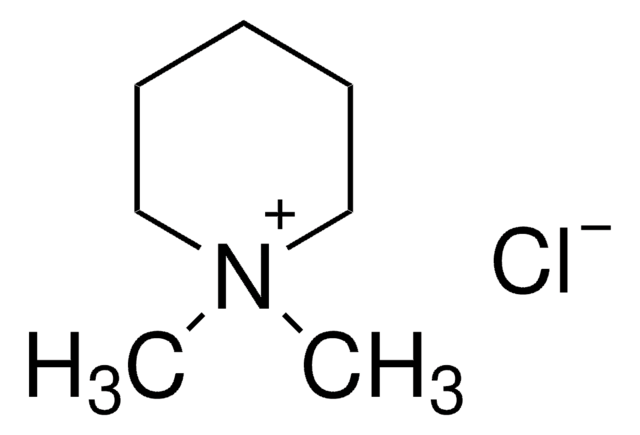93757
Chlormequatchlorid
certified reference material, TraceCERT®, Manufactured by: Sigma-Aldrich Production GmbH, Switzerland
Synonym(e):
2-Chlorethyltrimethylammoniumchlorid, Chlorcholinchlorid, Chlormequatchlorid, Cholin-dichlorid
About This Item
Empfohlene Produkte
Qualität
certified reference material
TraceCERT®
Qualitätsniveau
Produktlinie
TraceCERT®
Haltbarkeit
limited shelf life, expiry date on the label
Hersteller/Markenname
Manufactured by: Sigma-Aldrich Production GmbH, Switzerland
SMILES String
[Cl-].C[N+](C)(C)CCCl
InChI
1S/C5H13ClN.ClH/c1-7(2,3)5-4-6;/h4-5H2,1-3H3;1H/q+1;/p-1
InChIKey
UHZZMRAGKVHANO-UHFFFAOYSA-M
Suchen Sie nach ähnlichen Produkten? Aufrufen Leitfaden zum Produktvergleich
Verwandte Kategorien
Allgemeine Beschreibung
Certified content by quantitative NMR incl. uncertainty and expiry date are given on the certificate.
Download your certificate at: http://www.sigma-aldrich.com
Chlormequat chloride, also known as chlorocholine chloride (CCC) is the most widely used plant growth regulator that inhibits the biosynthesis of gibberellins. CCC is applied in agriculture and horticulture to promote sturdier growth by reducing the height of grain crops and increasing the diameter of the stems without causing a loss of plant productivity.
Chlormequat chloride has to be monitored in the Multiannual Control Programme for Pesticides Residues (MACP), run within the EU and EFTA in/on products of plant origin.
The European Communities (EC) have established maximum residue limits (MRLs) for CCC at 2 mg/kg for wheat, barley, and rye, 5 mg/kg for oat, and 0.05 mg/kg for other cereals. The agreed values of CCC as reported by EFSA are 0.04 mg/kg bw/day for the Acceptable Daily Intake (ADI), 0.04 mg/kg bw/day for the Acceptable Operator Exposure Level (AOEL), and 0.09 mg/kg bw/day for the Acute Reference Dose (ARfD).
According to Regulation (EU) No 540/2011, chlormequat is deemed to have been approved under Regulation (EC) No 1107/2009. This approval is restricted to its use as only a plant growth regulator.
Anwendung
- Investigate the effect of drought on plant growth, essential oil concentration, oil biosynthesis, and peroxidase activity in the leaves of C. martinii and C. winterianus
- Study the effect of ethrel, chlormequat chloride, and paclobutrazol on growth and pyrethrins levels in Chrysanthemum cinerariaefolium Vis.
- Study the effect of chlormequat chloride (CCC) application at the bolting stage on the flowering, seed yield, and seed quality of lettuce plants previously treated with water or gibberellic acid (GA3)
- Investigate the effects of nitrogen rate, seed rate, and chlormequat chloride on the grain quality of oats (Avena sativa)
Empfohlene Produkte
Rechtliche Hinweise
Signalwort
Danger
H-Sätze
Gefahreneinstufungen
Acute Tox. 3 Dermal - Acute Tox. 4 Oral
Lagerklassenschlüssel
6.1C - Combustible acute toxic Cat.3 / toxic compounds or compounds which causing chronic effects
WGK
WGK 2
Flammpunkt (°F)
Not applicable
Flammpunkt (°C)
Not applicable
Choose from one of the most recent versions:
Analysenzertifikate (COA)
Don't see the Right Version?
If you require a particular version, you can look up a specific certificate by the Lot or Batch number.
Besitzen Sie dieses Produkt bereits?
In der Dokumentenbibliothek finden Sie die Dokumentation zu den Produkten, die Sie kürzlich erworben haben.
Unser Team von Wissenschaftlern verfügt über Erfahrung in allen Forschungsbereichen einschließlich Life Science, Materialwissenschaften, chemischer Synthese, Chromatographie, Analytik und vielen mehr..
Setzen Sie sich mit dem technischen Dienst in Verbindung.






